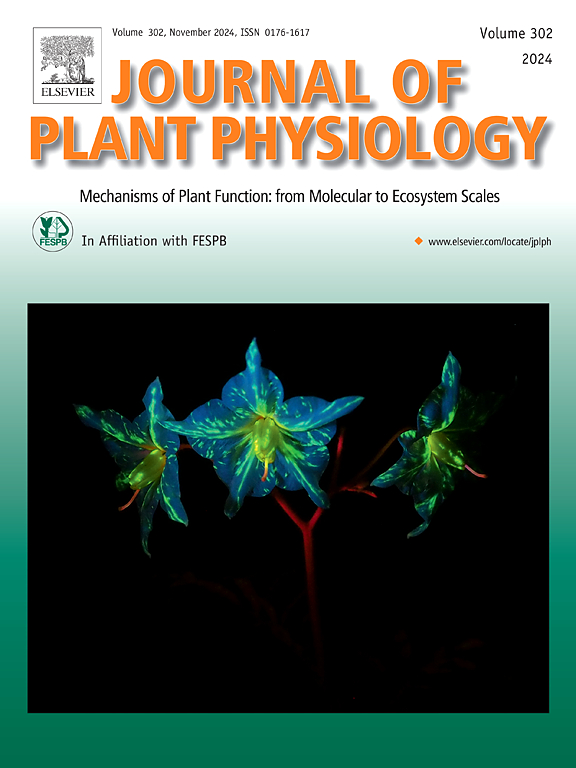植物的耐碱性:AT1 基因及其他
IF 4
3区 生物学
Q1 PLANT SCIENCES
引用次数: 0
摘要
盐胁迫对作物生产构成严重挑战,也是对全球粮食安全和生态系统可持续性的重大威胁。土壤盐碱化通常与碱化同时发生,造成盐碱综合胁迫。碱性土壤主要由 NaHCO3 和 Na2CO3 组成,pH 值较高。与中性盐胁迫相比,盐碱联合胁迫对作物生产的危害更大,因为它同时受到盐度升高和高 pH 值胁迫的影响。最近的一项研究通过对高粱进行基因组关联分析,发现耐碱性 1(AT1)是导致作物对碱性敏感的一个因素。AT1 是第一个被确定与耐碱性特别相关的基因,它编码 G 蛋白 γ 亚基(Gγ)。编辑 AT1 可提高在碱性土壤中种植的高粱、水稻、玉米和小米的产量,这表明 AT1 有潜力培育耐碱作物。在这篇综述中,我们总结了 AT1 在植物耐碱性中的作用,并对不同物种中单子叶植物和双子叶植物的 Gγ 亚基进行了系统发育分析和基因型比较。本文章由计算机程序翻译,如有差异,请以英文原文为准。
Alkaline tolerance in plants: The AT1 gene and beyond
Salt stress poses a serious challenge to crop production and a significant threat to global food security and ecosystem sustainability. Soil salinization commonly occurs in conjunction with alkalization, which causes combined saline–alkaline stress. Alkaline soil predominantly comprises NaHCO3 and Na2CO3 and is characterized by a high pH. The combined saline–alkaline stress is more harmful to crop production than neutral salt stress owing to the effects of both elevated salinity and high pH stress. Through genome association analysis of sorghum, a recent study has identified Alkaline tolerance 1 (AT1) as a contributor to alkaline sensitivity in crops. AT1, which is the first gene to be identified as being specifically associated with alkaline tolerance, encodes a G protein γ-subunit (Gγ). Editing of AT1 enhances the yields of sorghum, rice, maize, and millet grown in alkaline soils, indicating that AT1 has potential for generating alkaline-resistant crops. In this review, we summarize the role of AT1 in alkaline tolerance in plants and present a phylogenetic analysis along with a motif comparison of Gγ subunits of monocot and dicot plants across various species.
求助全文
通过发布文献求助,成功后即可免费获取论文全文。
去求助
来源期刊

Journal of plant physiology
生物-植物科学
CiteScore
7.20
自引率
4.70%
发文量
196
审稿时长
32 days
期刊介绍:
The Journal of Plant Physiology is a broad-spectrum journal that welcomes high-quality submissions in all major areas of plant physiology, including plant biochemistry, functional biotechnology, computational and synthetic plant biology, growth and development, photosynthesis and respiration, transport and translocation, plant-microbe interactions, biotic and abiotic stress. Studies are welcome at all levels of integration ranging from molecules and cells to organisms and their environments and are expected to use state-of-the-art methodologies. Pure gene expression studies are not within the focus of our journal. To be considered for publication, papers must significantly contribute to the mechanistic understanding of physiological processes, and not be merely descriptive, or confirmatory of previous results. We encourage the submission of papers that explore the physiology of non-model as well as accepted model species and those that bridge basic and applied research. For instance, studies on agricultural plants that show new physiological mechanisms to improve agricultural efficiency are welcome. Studies performed under uncontrolled situations (e.g. field conditions) not providing mechanistic insight will not be considered for publication.
The Journal of Plant Physiology publishes several types of articles: Original Research Articles, Reviews, Perspectives Articles, and Short Communications. Reviews and Perspectives will be solicited by the Editors; unsolicited reviews are also welcome but only from authors with a strong track record in the field of the review. Original research papers comprise the majority of published contributions.
 求助内容:
求助内容: 应助结果提醒方式:
应助结果提醒方式:


